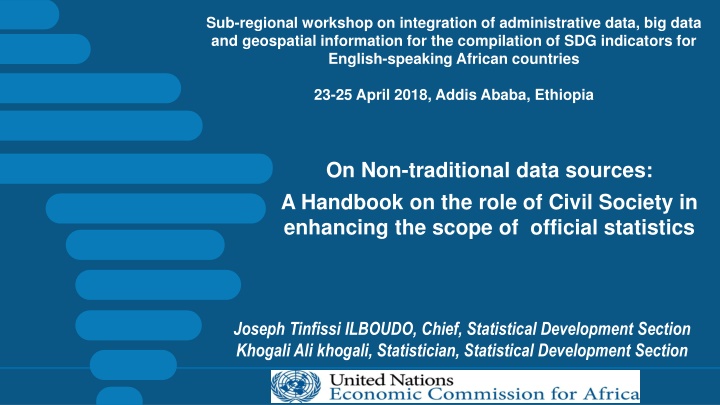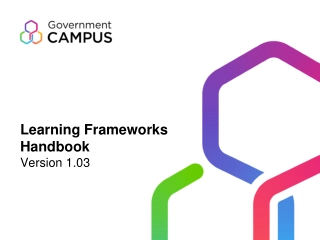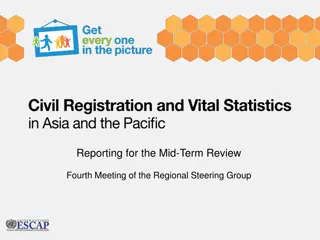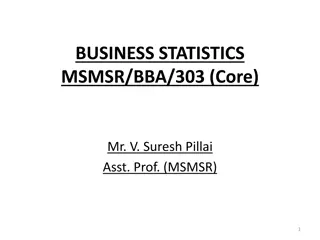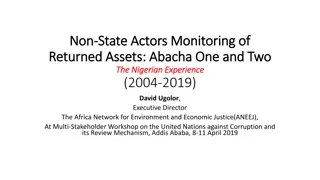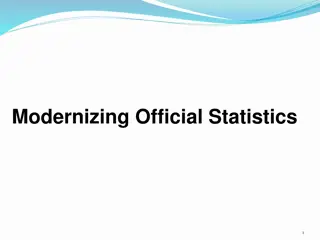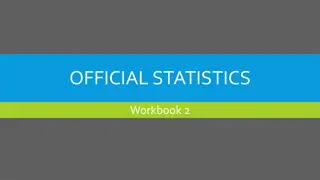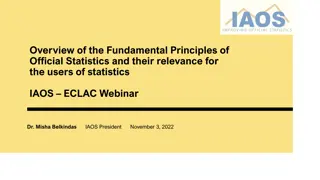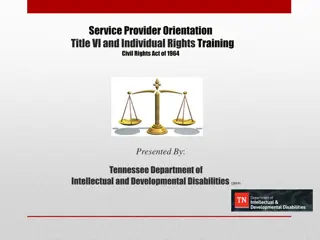Handbook on Civil Society's Role in Enhancing Official Statistics
Handbook explores the integration of civil society data sources into national statistical systems, advocating for greater citizen participation and transparency in socio-economic processes. It emphasizes the benefits of incorporating non-traditional data for effective policymaking and monitoring of development goals.
Download Presentation

Please find below an Image/Link to download the presentation.
The content on the website is provided AS IS for your information and personal use only. It may not be sold, licensed, or shared on other websites without obtaining consent from the author.If you encounter any issues during the download, it is possible that the publisher has removed the file from their server.
You are allowed to download the files provided on this website for personal or commercial use, subject to the condition that they are used lawfully. All files are the property of their respective owners.
The content on the website is provided AS IS for your information and personal use only. It may not be sold, licensed, or shared on other websites without obtaining consent from the author.
E N D
Presentation Transcript
Sub-regional workshop on integration of administrative data, big data and geospatial information for the compilation of SDG indicators for English-speaking African countries 23-25 April 2018, Addis Ababa, Ethiopia On Non-traditional data sources: A Handbook on the role of Civil Society in enhancing the scope of official statistics Joseph Tinfissi ILBOUDO, Chief, Statistical Development Section Khogali Ali khogali, Statistician, Statistical Development Section
CSOs as a Package of Resources CSOs as a Shaper Contribution from CSOs would influence NSS into more human-centred, socially-oriented measures of national performance; In the long run it could have a bearing on policy directions and frameworks of the key indicators used to measure progress; Evaluation and monitoring deprivation and poverty levels in society. Capturing social indicators; Providing data on interventions on critical and untapped areas in society (e.g.: counter-terrorism, peace and security); Shaping units of observations of the national statistical process.
CSOs as a Package of Resources (Cont.) CSOs as Enabler Increased visibility of government on the state of affairs, providing a fairer picture on major developmental issues; Increases the credibility of data gathered, investors confidence and public trust, which in essence will positively affect the cycle of national statistical systems, especially at the data consumption end improving knowledge management and shared information.
Background Handbook on the role of Civil society Organizations (CSOs) in statistical process [UNECA,2017]. https://ecastats.uneca.org/acsweb/LinkClick.aspx?fileticket=8LIcmc7Y d8I%3d&tabid=1375&portalid=0&mid=3268 Why there is a need to develop this handbook?
Justification of developing a handbook on the role of CS in statistical process Mainstream CSOs data sources into NSS Integrate, coordinate and disseminate data provided by CSOs in National Statistical Systems propose mechanisms for integrating and coordinating the contribution of CSOs to NSSs; Facilitate CSOs to use official statistics to support greater citizen participation in socio- economic and transparent political processes; Advocate to users for the effective and efficient use of official statistics in the performance of their activities and the critical delivery of their services in the context of the implementation of development agenda including the Sustainable Development Goals, as well as to make official statistics provided by the CSO at the level of the NSSs and statistical authorities. a. b. c. d.
Mainstreaming CSOs within the NSS The Handbook propose a model that will accommodate CSOs within the NSS in order to overcome the constraints of the existing models.
Mainstreaming CSOs within the NSS: Proposed Model: Vision of the handbook This model requires a constant improvement in the coordination of the national statistical system, with adequate funding and sufficient human resources and effective support to the sectors.
The role the CSOs in enhancing the scope of the NSS Relevance CSOs players in the process of producing although most of the time they are not recognized as producers of official statistics. are important Accessibility Quality CSO statistics, Data collection Others
Handbook content Chapter II Chapter III Chapter IV The Context of Production of Statistics in Africa The Legal and Institutional Framework The Role of CSOs and NSOs on National, Regional, and Global development agenda Agenda 2063, SHaSA II, SDG, Busan Action Plan, Marrakech Plan of Action Data Revolution, Big Data and Cartography
Handbook content Chapter VII Chapter VI Chapter V The Role of Civil Society Organizations as Users of Statistics Partnerships of Civil Society Organizations and National Statistics Institutes The Role of Civil Society Organizations as Data Producers Mechanisms needed to link CSO to be component within NSS CSOs Partnerships perspective on NSOs Partnerships perspective on Capacity requirements are needed for CSOs to channel their data to be a component of official statistics
CSOs as a non-traditional data source; CSOs and Data revolution NON-TRADITIONAL DATA SOURCE (BIG DATA) DATA INFORMATION STATISTICS Compliance with the Fundamental Principals for Official Statistics Compliance with the National Statistics System Law Producer must be inside the National Statistics System Produced/Used in accordance with Concepts, classifications, and methodologies to be approved. NOT OFFICIAL STATISTICS OFFICIAL STATISTICS
The way forward The final version of the handbook will be share with all NSOs of our member states for their piloting and feedback It is envisaged that UNECA and development partners to encouraging the countries in Africa in implementing the guidelines and recommendations contained in the handbook
